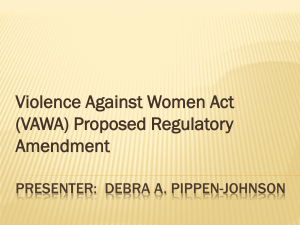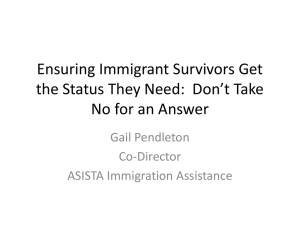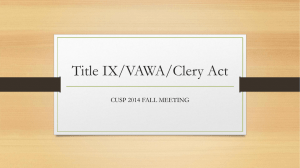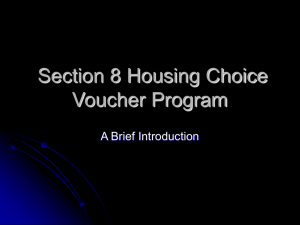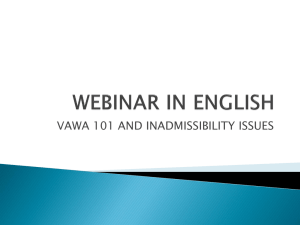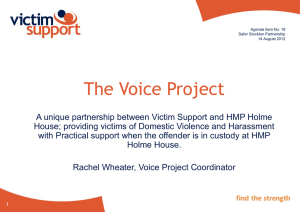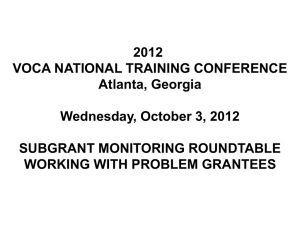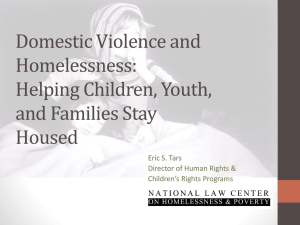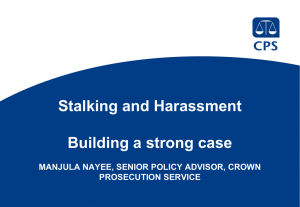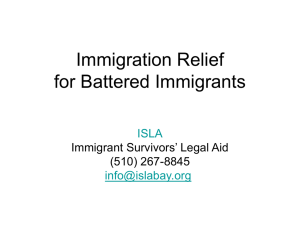VAWA TENANT PROTECTIONS
advertisement
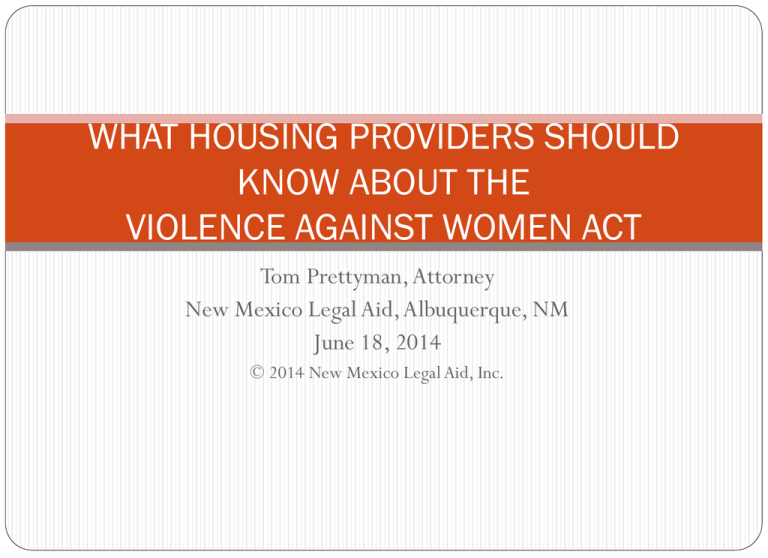
WHAT HOUSING PROVIDERS SHOULD KNOW ABOUT THE VIOLENCE AGAINST WOMEN ACT Tom Prettyman, Attorney New Mexico Legal Aid, Albuquerque, NM June 18, 2014 © 2014 New Mexico Legal Aid, Inc. 1. VIOLENCE AGAINST WOMEN ACT (VAWA) Grants to law enforcement, courts, shelters, social service agencies, housing providers & government agencies providing services to DV victims Creates a national database for DV protection orders. Makes a DV protection order issued by a state, tribe or territory more easily enforceable by other states, tribes & territories Applies to male and female victims alike. 1. VAWA (Continued) Enacted in 1994,reauthorized 2000, 2005 and 2013 VAWA 2013 extends protections to Victims on tribal land LGBT and immigrant victims Victims of sexual assault Residents of additional subsidized housing programs HUD issued a notice about VAWA 2013 changes, but has not issued new regulations for VAWA 2013 2. RELATIONSHIP BETWEEN HOUSING & DOMESTIC VIOLENCE Congress has found Strong link between DV & homelessness. Tenants are discriminated against, denied access to and evicted from housing because of status as DV victims Victims who leave their abusers have trouble finding long-term housing, and often return to their abusers due lack of housing options. 3. “COVERED HOUSING PROGRAMS” UNDER VAWA Covered byVAWA 2005 Public Housing HCV Section 8 Project-Based Sec. 8 Section 202/811 Added byVAWA 2013 236 Multifamily 221(d)(3) BMIR HOME HOPWA McKinney Vento Act USDA/RD LIHTC 3. “COVERED HOUSING PROGRAMS” UNDER VAWA (continued) Applies to PHAs, owners and property managers. VAWA does not protect tenants in private market rate housing. 4. WHO DOES VAWA PROTECT? Victims of actual or threatened Domestic Violence Dating Violence Sexual Assault (VAWA 2013) Stalking “Affiliated Individual” of the victim (spouse, sibling, child of victim; individual to whom victim stands in loco parentis; person lawfully living in victim's household). VAWA 2013 extends coverage to LGBT & immigrant victims and victims on tribal lands 5. TO WHICH PHA/OWNER/MANAGER ACTIONS DOES VAWA APPLY? Admissions Evictions and subsidy terminations 6. ADMISSIONS PHAs, owners, and managers shall not deny an applicant housing on the basis that an applicant was victim of domestic violence, dating violence, sexual assault or stalking. 7. EVICTIONS & TERMINATIONS PHAs/owners/managers may not evict or terminate assistance for tenant on the basis that the tenant is a victim. Crimes against victim “directly relating to” the abuse are not grounds for evicting the victim or terminating her subsidy. An incident of actual or threatened domestic violence is not a “serious or repeated lease violation” or good cause for eviction of the victim or terminating the victim’s subsidy. Tenant protections do not apply to violations unrelated to DV. 7. EVICTIONS & TERMINATIONS (continued) EXCEPTIONS PHAs and landlords can evict the victim if they can demonstrate an “actual and imminent threat” to other tenants or employees at the property if the victim is not evicted. VAWA 2013 does not define “actual and imminent threat”. Regulations for VAWA 2005 define “actual and imminent threat” as physical danger that is real, would occur within an immediate timeframe, and could result in death or serious bodily harm. 7. EVICTIONS & TERMINATIONS (continued) BIFURCATION PHA, owner or manager may evict or terminate assistance to the abuser while allowing a victim who is a lawful occupant to remain (also in NM state law). • COMPLIANCE WITH COURT ORDERS PHAs, owners and managers must comply with court orders regarding the rights or access to property or distribution, possession or control of property (including DV protection orders). 7. EVICTIONS & TERMINATIONS (continued) REMAINING HOUSEHOLD MEMBERS If the individual who is evicted is the sole tenant eligible to receive housing assistance, PHA, owner or manager must give any remaining tenant an opportunity to establish eligibility for that program or a reasonable time to move or establish eligibility for another covered housing program. 7. EVICTIONS & TERMINATIONS (continued) New Mexico Uniform Owner Resident Relations Act (UORRA) provides for bifurcation of a residential lease in the case of DV victims This state law protection applies to all residential tenancies, whether subsidized or unsubsidized. 8.PORTABILITY PHA may permit section 8 family to port out if family has complied with all obligations of program and is moving to protect health and safety of a victim. Portability is permitted in this situation even if lease term has not expired. 9. CERTIFICATION Where applicant/tenant claims protection under VAWA, PHA, owner or manager may, but is not required to, request in writing that tenant/applicant provide documentation. Tenant/applicant must provide documentation in 14 business days after written request. PHA/owner/manager has discretion to extend deadline. 9. CERTIFICATION (continued) Form of documentation: HUD/USDA/Dept of Treas.-approved form stating (1) applicant or tenant is victim, (2) incident meets VAWA requirements, and (3) name of abuser, if known and safe to provide; OR Statement signed under penalty of perjury by victim service provider, attorney, medical or mental health professional that he/she believes incident meets VAWA requirements AND signed by tenant/applicant; OR Record of federal, state, territorial, tribal or local law enforcement agency, court or administrative agency; OR Statement or other evidence at discretion of PHA/owner/manager. 9. CERTIFICATION (continued) Where there are conflicting certifications, PHA/owner/manager may require applicant or tenant or submit additional third-party documentation. 10. EMERGENCY TRANSFERS Applicable federal agency must adopt model emergency transfer plan for use by PHAs, owners and managers. Transfer to available and safe dwelling unit under a covered housing program if (1) requested by tenant and (2) (a) tenant reasonably believes she is threatened with imminent harm from further violence if she stays or (b) tenant is victim of sexual assault that occurred in premises within prior 90 days. Plan must include confidentiality measures. Neither HUD, USDA nor Treasury has adopted a model plan. 12. CONFIDENTIALITY PHA, owner, manager must keep confidential the certification information provided by victim. Information cannot be entered in a shared database or disclosed to others unless Consented to by victim, Required for use in eviction proceeding, or Otherwise required by law Employees of PHA, owner or manager are prohibited from accessing info unless specifically and authorized to do so because it is necessary for their work. 13. NOTICES & LANGUAGE ACCESS Agencies must develop a notice of VAWA housing rights for applicants and tenants (has not happened yet). PHAs, owners and managers must give the notice and the agency-approved self-certification form to applicants and tenants at 3 junctures: Time of denial of admission, Time of admission, and With any notice of termination or eviction. Notice must be available in multiple languages and be consistent with HUD guidance. 14. VAWA DOES NOT CLEARLY ADDRESS Program violation with indirect link to abuse. For example, what if abuser refuses to pay rent? Situation where victim repeatedly reconciles with the abuser, who returns to cause program violation. DISCLAIMER The information in this presentation is for informational purposes only. This information does not constitute legal advice or a legal opinion and should not be relied on as legal advice or opinion. For legal advice, please contact your attorney.
